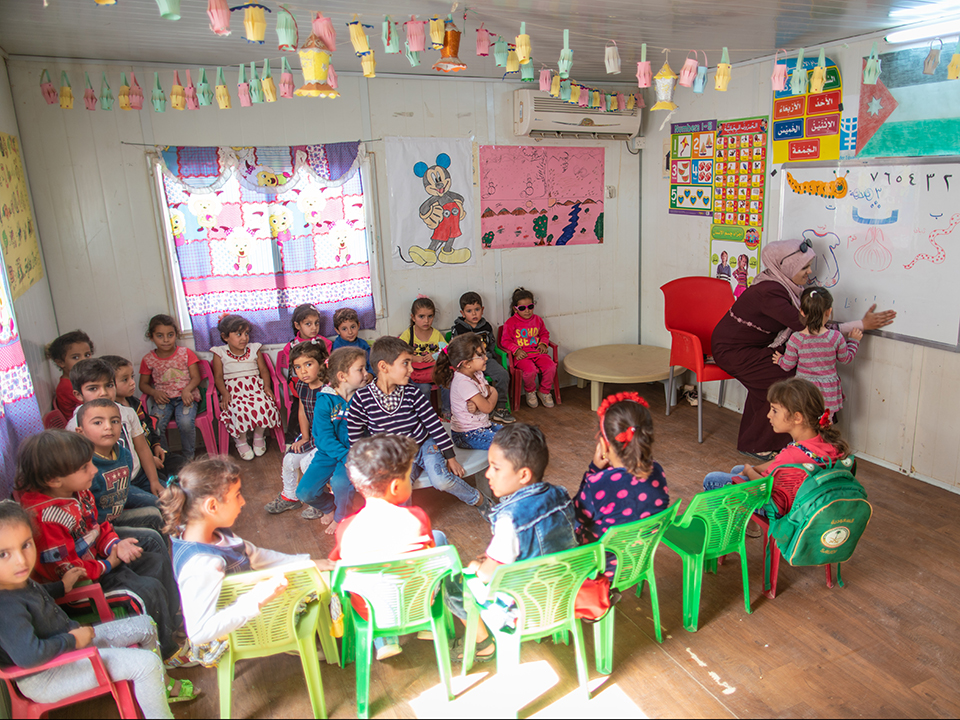From where I stand: “It was an incredible feeling to be back again in the classroom.”
Date:
The Za’atari refugee camp is home to 76,378 refugees, of which 19,243 are school-age children1. To support parents and children to continue their education during the COVID-19 pandemic, UN Women increased the number of Syrian refugee teachers enrolled in the Oasis’ incentive-based volunteer programme. One of them is Nahid Ali Albuhair, 31, from Daraa Syria, whose passion for teaching roots back to her life before the conflict. This is her journey of resilience between two crises.

Over 300 children benefit from the childcare services and classes available in the Za’atari refugee camp in Jordan. Photo: UN Women/ Christopher Herwig
![]() In 2013, the conflict rumbled my home in Rif-Dimashq near Damascus. I had to gather all my strength and courage to make the journey to Jordan, with my sixty-year-old mother and two children by my side. Days later, we arrived in the Za’atari refugee camp.
In 2013, the conflict rumbled my home in Rif-Dimashq near Damascus. I had to gather all my strength and courage to make the journey to Jordan, with my sixty-year-old mother and two children by my side. Days later, we arrived in the Za’atari refugee camp.
In the beginning, it was stressful and exhausting. I was the sole provider for my family and, most importantly for me, I wanted to ensure they can continue with their education.
Yet, fleeing my country, overcoming such difficult circumstances and building my new life as a refugee, did not take away my dream of becoming a teacher. Once I began to feel more stable in our new life in the camp, I decided to look for livelihood opportunities in the field of education.
Before the conflict, I graduated in Arabic literacy at the University of Syria and I even started to deliver classes to students during my studies. Teachers have always been my role models; I was inspired by the wealth that comes with knowledge.
At the beginning of this year, I finally managed to become a teacher at the UN Women’s Oasis center, where I can support more than 20 students every day. It was an incredible feeling to be back again in the classroom.
Looking back at my journey as a refugee and now working at the Oasis, I have realized that education is one of the most powerful tools to empower women and girls, as it can equip them with knowledge and skills, as well as with the confidence to stand up for their rights.
Education is also fostering equality among students. Men and boys have a huge part to play in strengthening women’s and girls’ voices. One hand cannot clap, but together everything can be possible.
And now, as we face the COVID-19 pandemic, it is critical that we adapt our teaching methods to ensure women, girls, and youth still have access to education during the lockdown. I continue to teach my students virtually, recording videos of my lessons, and sending it to the students’ parents to assist them with their homework.
My message to all women, men, girls, boys, and refugees is to continue to advocate, speak out, and fight for your rights together and as one.”
Nahid Ali Albuhair teaches Arabic literacy and classes to children from the ages 3-10, at the UN Women Oasis Centre in the Za’atari refugee camp, which provides educational opportunities to more than 3500 vulnerable Syrian refugees yearly with the generous support of the governments of Canada, Finland, France, Iceland, Italy and Zonta International, as well as UN Women National committees under the ‘Eid bi Eid’ pooled fund mechanism. Her story relates to Sustainable Development Goal (SDG) 16, which promotes peace and security, SDG 5 on gender equality and the empowerment of women, as well as SDG 8, which seeks full and productive employment and decent work for all.